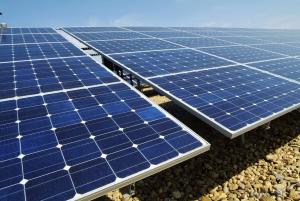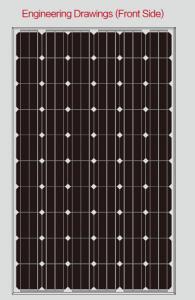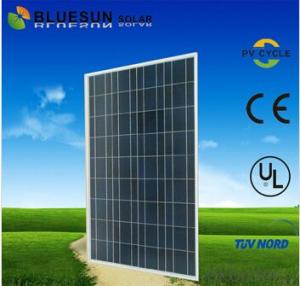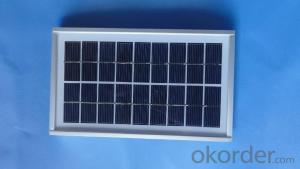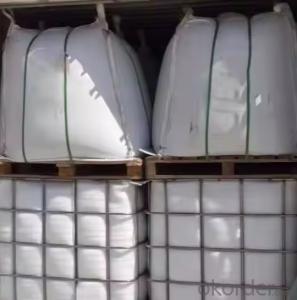80w Poly Solar Module With High Efficiency
- Loading Port:
- Tianjin
- Payment Terms:
- TT OR LC
- Min Order Qty:
- 1 watt
- Supply Capability:
- 100000 watt/month
OKorder Service Pledge
OKorder Financial Service
You Might Also Like
Item specifice
Product Description:
1.Structure of Solar Module Description
CNBM Solar's photovoltaic module is designed for designed for large electrical power requirement. It is the optimal choice for both on-grid and off-grid power systems. CNBM Solar offers high performance of power per square foot of solar array.
2.Main Features of the Solar Module
Solar Cell: High efficency crystalline solar cell. Even if under the weak light, the solar module can produce maximum power output.
Tempered glass: Anti-reflecting coating and high transmission rate glass increase the power output and mechanical strength of solar module.
EVA and TPT: Using high quality EVA and TPT to prevent destroying and water.
Strong aluminum frames to strengthen the load hold and to stand against high wind.
Junction box: Multi function junction box with water proof.
Long lifetime: ≥25 years; Less power decrease.
Good performance of preventing from atrocious weather such as wind and hails.
Resisting moisture and etching effectively, not effected by geology.
The certificate issued by international authority: UL, TUV, IEC, VDE, CE.
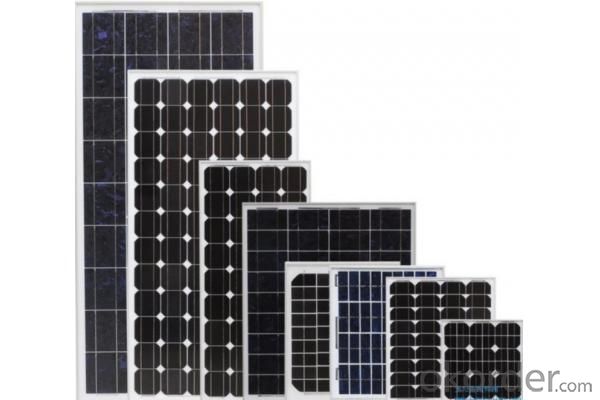
Solar panel working process
In addition to being the ultimate source of all life on earth, the sun is an infinitely renewable, completely pollution-free source of electricity. Instead of burning fossil fuels dug up from the ground in a big power plant – a very 19th century, industrial age approach, when you think about it – solar panels convert sunlight directly into electricity, with no harmful emissions.
The basic unit of a solar panel is a solar cell, which usually consists of one or two layers of silicon-based semiconductor wafers. When struck by the photons in sunlight, the solar cell generates an electrical charge due to the "photovoltaic effect" – which is a pretty good name, since it produces voltage from photons. The flow of these electrons moves in a steady electrical current from one side of the cell to the other.
Dozens of these PV cells are packaged together into solar modules, which in turn are packaged into solar panels that are mounted on a rooftop and arranged to maximize their hours of exposure to direct sunlight. Because the electricity generated by all those solar cells is direct current (DC), it is then sent to an inverter that transforms the power into the same alternating current (AC) used by the appliances in your home and the local utility electricity distribution grid. Increasingly, these inverters are getting "smart," providing data monitoring for solar installation performance and other grid integration services.
- Q:what percentage of sunlight is converted into electrical energy in a solar panel?
- Depending on the type of solar panel, any where from 6% to 42.8%.
- Q:Can solar panels be installed on any type of roof?
- Solar panels can be installed on almost any type of roof, including asphalt shingle, metal, tile, and flat roofs. However, the feasibility and ease of installation may vary depending on the roof's condition, angle, and orientation towards the sun.
- Q:How long does it take to recoup the cost of solar panels through energy savings?
- The time it takes to recoup the cost of solar panels through energy savings varies depending on various factors such as the cost of installation, the amount of sunlight received, the energy consumption of the household, and any applicable rebates or incentives. On average, it can take anywhere from 5 to 20 years to recoup the initial investment. However, with the decreasing costs of solar panels and the rising energy prices, the payback period is becoming shorter, making solar panels a more financially viable option for many homeowners.
- Q:hi so im doing a school project thing and they have a lot of different questions for us that help us decide whether we would rather a city have a nuclear reactor, or solar panel. But i cant seem to get the last 2 questions...help please???so question ........What types of emissions, if any, are produced by each type of generating station? Do these emissions affect human health?question 2.....What are the long term financial costs associated with maintaining each type of generating station?thanks!
- You should research nuclear reactors and their emissions. Mostly it's waste heat, and if they use a water-based cooling reactor, there can be significant emissions of water vapor. Some might consider the spent fuel an emission too. Waste nuclear material disposal is a problem. Research it. Solar panels have no emissions during operation, but there is some nasty stuff emitted when they are manufactured. 2: Maintenance of solar panels is pretty straightforward: keep them clean, trim overhanging trees, shrubs, etc., check for and clean corrosion, contaminants, etc. regularly. Maintenance of nuclear power plants, so far, is a full time job for many technicians and engineers. The recently developed portable (the size of a shed) nuclear generators claim zero maintenance for 20+ years. That's a big improvement.
- Q:my dad met a guy representive for a solar panel company at a swapmeet Scam?
- Hard to say. Solar panels are becoming more common these days. May want to ask if the vendor is licensed and bonded contractor (if he's doing installation as well as panel sales). Find out the name of the equipment that this guy is selling (panels and other hardware) and do a search. For that matter, get the guys name and do a search on it to see he pops up elsewhere.
- Q:How do solar panels affect the value of a home?
- Solar panels can significantly increase the value of a home. They offer long-term cost savings on electricity bills and can generate additional income through net metering or selling excess energy back to the grid. Additionally, solar panels are environmentally friendly, which appeals to many buyers and can make a property more attractive in the market.
- Q:During the summer my house uses about .47 kw/h I am wondering what solar panel do I need to cover most or all the electric bill. A link would be helpful too :)
- They make panels now that put out 25 watts so about 8 panels would do it.
- Q:Is it as simple as buying the panels, an inverter and plugging it into a wall-socket, assuming it would just send power back into the outlet and supplement my house's electrical usage, or... Is it not that simple?Remember, I'm talking about a SMALL system, and I don't care how little power it'd make, or how uneconomical it would be.
- If I were to assume you could (and I don't) you'd be back feeding voltage into your breaker and probably ruin it. Or worse, start a fire somewhere on that circuit. Not to mention the need to match the Hertz AND the signal. Short answer is No, you can't do that. Not because of code - but code wouldn't allow it anyway, but because it is foolish and beyond dangerous - it's a guaranteed disaster. Hope this helps. ??? —
- Q:Can solar panels be installed on a commercial building?
- Yes, solar panels can definitely be installed on a commercial building. In fact, many businesses are increasingly adopting solar energy to reduce their carbon footprint, save on electricity bills, and take advantage of various incentives and tax credits available for renewable energy installations. Commercial buildings often have ample roof space and large surface areas, making them ideal for the installation of solar panels. Additionally, advancements in solar technology and the availability of flexible mounting options make it easier to integrate solar panels into commercial building designs.
- Q:So, I've seen cheap solar panel kits for sale from Harbor Freight, and regardless of whether or not I were to buy a set from them or someone else, I was wondering what the process of implementing a small-scale solar system into your household electrical system would be.I've read articles that started out too in-depth or were speaking of systems on a much larger scale.Can it be as easy as buying the panels and inverter, and plugging it into a socket, or is there more to it?Some of the articles I was reading had mentioned having to contract with your electrical supplier, having to have an electrician tie it all in in some special/ necessary way, using a battery pack (would this be necessary for a tied-in system?), or using the system to only power single items, like a water heater, or plugging items into a connected battery-pack, all of which I'm not sure is necessary or needed for what my goals/ means are/ would be.
- You can't directly connect solar panel into household electrical system,you need to convert DC power to AC power more over it will cost more amount...
1. Manufacturer Overview |
|
|---|---|
| Location | |
| Year Established | |
| Annual Output Value | |
| Main Markets | |
| Company Certifications | |
2. Manufacturer Certificates |
|
|---|---|
| a) Certification Name | |
| Range | |
| Reference | |
| Validity Period | |
3. Manufacturer Capability |
|
|---|---|
| a)Trade Capacity | |
| Nearest Port | |
| Export Percentage | |
| No.of Employees in Trade Department | |
| Language Spoken: | |
| b)Factory Information | |
| Factory Size: | |
| No. of Production Lines | |
| Contract Manufacturing | |
| Product Price Range | |
Send your message to us
80w Poly Solar Module With High Efficiency
- Loading Port:
- Tianjin
- Payment Terms:
- TT OR LC
- Min Order Qty:
- 1 watt
- Supply Capability:
- 100000 watt/month
OKorder Service Pledge
OKorder Financial Service
Similar products
New products
Hot products
Related keywords
